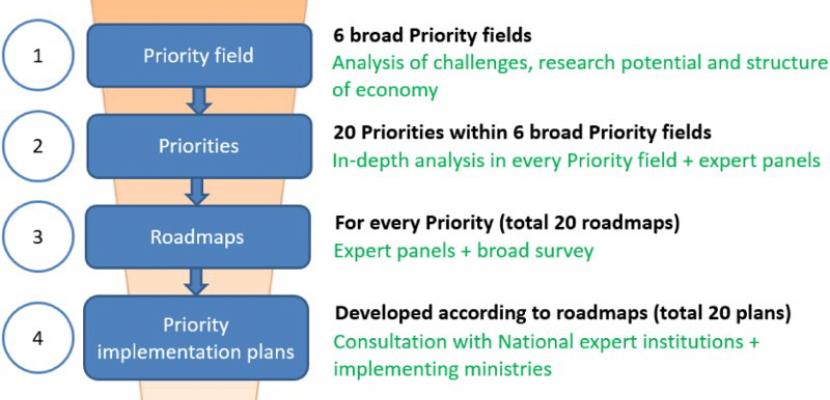Image

The case of Lithuanian Smart specialization
Published on 17 April 2018

Lithuania
This is the good practice's implementation level. It can be national, regional or local.
About this good practice
The official and formal start of the RIS3 preparation can be tracked back to 24 October 2012, when the Lithuanian Government updated an existing resolution of integrated science, studies and business centres (Valleys). These Valleys already present possible areas of specialization for the country, but according to the evaluation of research potential, the R&D capacities within the listed fields of the Valleys were uneven and lacking research potential to be considered as priorities.
The results of the analyses were verified by national surveys of various stakeholders and the RIS3 platform. The end result 6 broad priorities, which – in panel discussions – were added with in total twenty priorities. The final priority fields for national innovation priorities were mapped.
A review of Lithuanian economy strengths and prospects for knowledge-driven growth were also investigated.
The results of the analyses were verified by national surveys of various stakeholders and the RIS3 platform. The end result 6 broad priorities, which – in panel discussions – were added with in total twenty priorities. The final priority fields for national innovation priorities were mapped.
A review of Lithuanian economy strengths and prospects for knowledge-driven growth were also investigated.
Resources needed
The support of national or local governance.
Evidence of success
There are certain lessons, based on Lithuanian experience, about the process of designing an RIS3 can be articulated:
- Entrepreneurial discovery.
- Concentration on research results.
- Inter-sector/interdisciplinary approach.
- Identification and implementation of priorities as an inclusive process.
Despite implementation plans and programmes, Smart specialization itself was not a plan – it became a vision.
- Entrepreneurial discovery.
- Concentration on research results.
- Inter-sector/interdisciplinary approach.
- Identification and implementation of priorities as an inclusive process.
Despite implementation plans and programmes, Smart specialization itself was not a plan – it became a vision.
Potential for learning or transfer
1. ‘Different understanding of the RIS3’. The various interpretations about the ‘ex ante’ conditioning and the purpose of the RIS3 by the participants involved were an obstacle to progress.
2. ‘It was hard to involve all the planned representatives’. During the first step, knowledge about the importance of the RIS3 was very limited, which led to passive participation.
3. ‘Low participation from the business sector’. The involvement of the business sector was lower than the public sectors in all steps, due to the dominant traditional sectors of the Lithuanian economy.
4. ‘Excellence everywhere’. The RIS3 was the prioritization process, based on the analysis and interpretation of available data. Representatives from most of the participating sectors of the economy or universities tried to prove the excellence of their activities, even if it contradicted the analysis, in order to be identified as a priority.
2. ‘It was hard to involve all the planned representatives’. During the first step, knowledge about the importance of the RIS3 was very limited, which led to passive participation.
3. ‘Low participation from the business sector’. The involvement of the business sector was lower than the public sectors in all steps, due to the dominant traditional sectors of the Lithuanian economy.
4. ‘Excellence everywhere’. The RIS3 was the prioritization process, based on the analysis and interpretation of available data. Representatives from most of the participating sectors of the economy or universities tried to prove the excellence of their activities, even if it contradicted the analysis, in order to be identified as a priority.
Further information
Website
Good practice owner
You can contact the good practice owner below for more detailed information.
Organisation
Research and Higher Education Monitoring and Analysis Centre

Lithuania
Contact
Innovation consultant